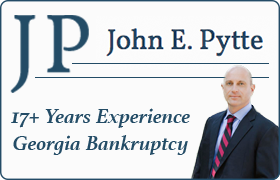Tybee Island Credit & Debt Lawyer, Georgia
Sponsored Law Firm
-
 x
x

Click For More Info:
-
John E. Pytte
617 Stevenson Ave Suite 102 Savannah, GA 31405 » view mapChapter 13, Chapter 7, Foreclosure Your Georgia Debt Relief Specialist
Bankruptcy has lost much of its once onerous meaning. The perception has changed largely because of the experience of thousands of people.
800-948-3470  John E. Pytte Savannah, GA
John E. Pytte Savannah, GAAttorney At Law - GA, 1995
University of Georgia School of Law
 Rebuild Credit
Rebuild CreditMost people choose to keep their personal property and just include the loan in their Chapter 13 plan.
William T. Daniel
Real Estate, Insurance, Corporate, Credit & Debt
Status: In Good Standing Licensed: 46 Years
James L. Drake
Credit & Debt, Bankruptcy, Bankruptcy & Debt
Status: In Good Standing Licensed: 50 Years
David Michael Conner
Dispute Resolution, Workers' Compensation, Corporate, Credit & Debt
Status: In Good Standing
Robert Warren Attridge
Traffic, Divorce & Family Law, Felony, Credit & Debt
Status: In Good Standing Licensed: 40 Years
Stephen H. Harris
Federal Trial Practice, Family Law, Insurance, Credit & Debt
Status: In Good Standing Licensed: 53 Years
Wendy Anne Owens
Real Estate, Dispute Resolution, Credit & Debt, Bankruptcy
Status: In Good Standing Licensed: 26 Years
John Erling Pytte
Bankruptcy & Debt, Tax, Consumer Bankruptcy, Credit & Debt, Collection
Status: In Good Standing Licensed: 29 Years
FREE CONSULTATION
CONTACT

 John E. Pytte Savannah, GA
John E. Pytte Savannah, GA Rebuild Credit
Rebuild Credit
